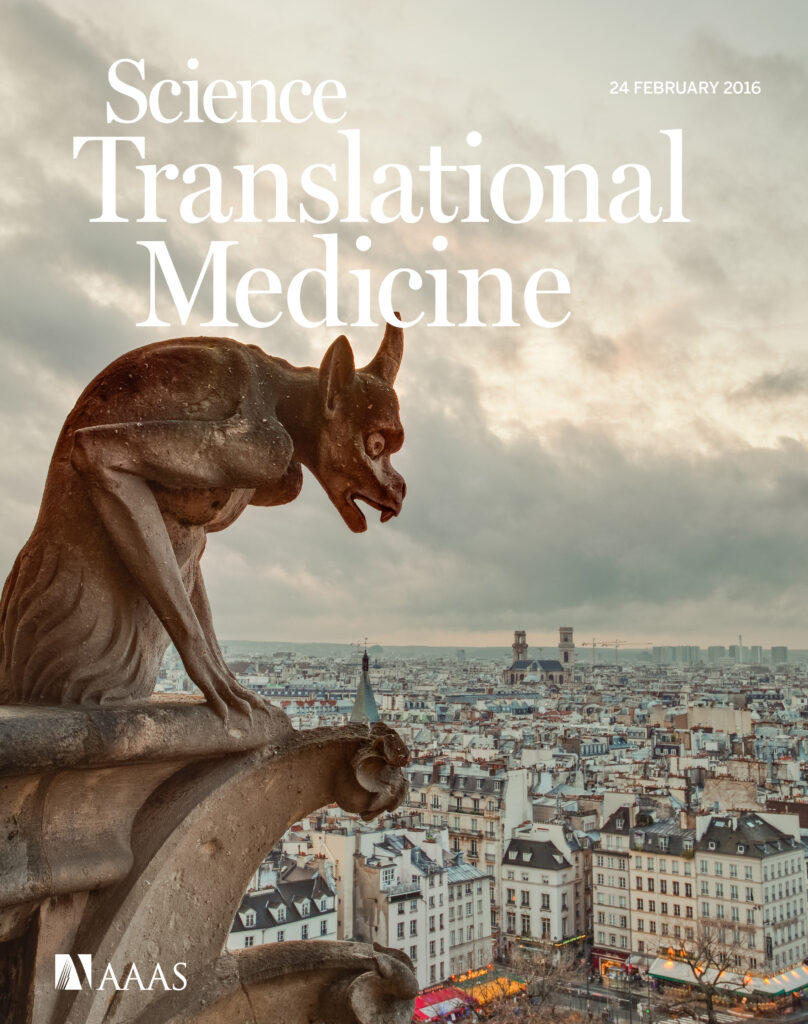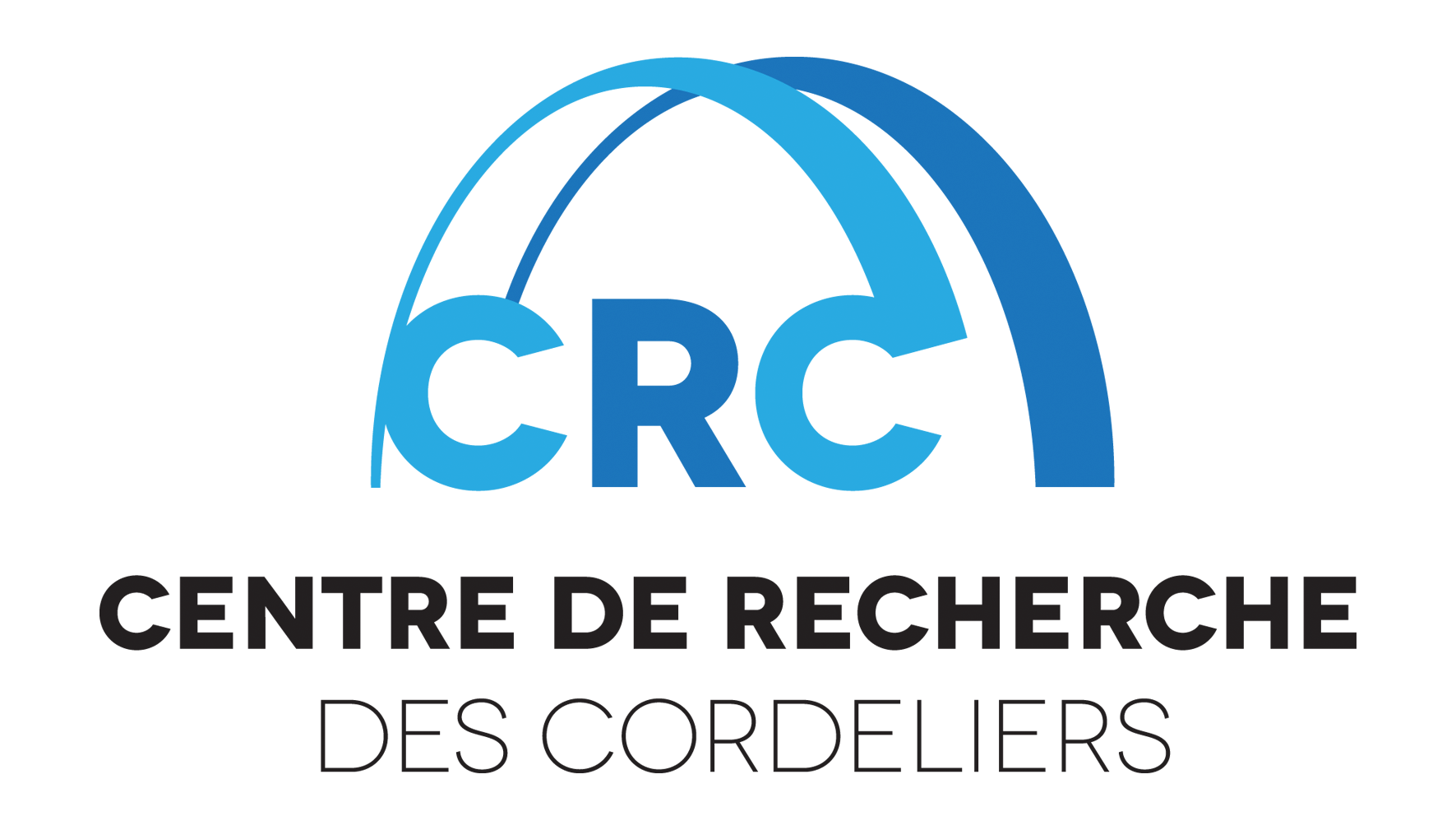25/02/2016
Cet artice a fait l’objet d’un communiqué de presse INSERM.
L’article de Jérôme GALON et son équipe a fait la Une de Science Translational Medicine.

The tumor microenvironment and Immunoscore are critical determinants of dissemination to distant metastasis
Bernhard Mlecnik1,2,3,§, Gabriela Bindea1,2,3,§ , Amos Kirilovsky1,2,3,§, Helen K. Angell1,2,3,4, Anna C. Obenauf5, Marie Tosolini1,2,3, Sarah E. Church1, 2, 3, Pauline Maby1,2,3, Angela Vasaturo1,2,3, Mihaela Angelova1,2,3, Tessa Fredriksen1,2,3, Stéphanie Mauger1,2,3, Maximilian Waldner6, Anne Berger7, Michael R. Speicher5, Franck Pagès1,2,3,8, Viia Valge-Archer9, Jérôme Galon1,2,3, #
1 INSERM, UMRS1138, Laboratory of Integrative Cancer Immunology, F-75006, Paris, France. 2 Université Paris Descartes, Sorbonne Paris Cité, UMRS1138, F-75006, Paris, France. 3 Sorbonne Universités, UPMC Univ Paris 06, UMRS1138, Centre de Recherche des Cordeliers, F-75006, Paris, France. 4 AstraZeneca, Cambridge, UK. 5 Institute of Human Genetics, Medical University of Graz, Graz, Austria. 6 Department of Medicine, University of Erlangen-Nuremberg, Erlangen, Germany. . 7 AP-HP, Assistance Publique-Hopitaux de Paris, Departments of General and Digestive Surgery, HEGP, Paris, France. 8 AP-HP, Assistance Publique-Hopitaux de Paris, Departments of Immunology, HEGP, Paris, France. 9 MedImmune Ltd, Cambridge, United Kingdom. § These authors contributed equally to this work
# Correspondence should be addressed to Jérôme Galon.
One Sentence Summary: Our data reveal mechanisms associated with metastatic invasion, and the major importance of the local lymphatic vessel density and immune cytotoxicity over tumor-related features to prevent metastasis.
Abstract
Although distant metastases account for the majority of deaths in cancer patients, fundamental questions regarding mechanisms that promote or inhibit metastasis remain unanswered. Here we show the impact of mutations, genomic instability, lymphatic and blood vascularization, and the immune contexture of the tumor microenvironment on synchronous metastases, in large cohorts of colorectal cancer patients. We observed large genetic heterogeneity among primary tumors, but no major differences in chromosomal instability or key cancer-associated mutations were found between patients. Similar patterns of cancer-related gene expression levels were observed between patients. No cancer-associated genes or pathways were associated with M-stage. Instead, mutations of FBXW7 were associated with the absence of metastasis and correlated with increase expression of T-cell proliferation and antigen presentation functions. Analyzing the tumor microenvironment, two hallmarks of the metastatic process were observed: decreased presence of lymphatic vessels and reduced immune cytotoxicity. These events could be the initiating factors driving both synchronous and metachronous metastases. Our data demonstrate the protective impact of the Immunoscore, a cytotoxic immune signature and increased marginal lymphatic vessels, against the generation of distant metastases, regardless of genomic instability. These findings identify potential biomarkers and targets for novel immunotherapies.



1 INSERM, UMRS1138, Laboratory of Integrative Cancer Immunology, F-75006, Paris, France.
2 Université Paris Descartes, Sorbonne Paris Cité, UMRS1138, F-75006, Paris, France.
3 Sorbonne Universités, UPMC Univ Paris 06, UMRS1138, Centre de Recherche des Cordeliers, F-
75006, Paris, France.
4 AstraZeneca, Cambridge, UK.
5 Institute of Human Genetics, Medical University of Graz, Graz, Austria.
6 Department of Medicine, University of Erlangen-Nuremberg, Erlangen, Germany. .
7 AP-HP, Assistance Publique-Hopitaux de Paris, Departments of General and Digestive Surgery,
HEGP, Paris, France.
8 AP-HP, Assistance Publique-Hopitaux de Paris, Departments of Immunology, HEGP, Paris, France.
9 MedImmune Ltd, Cambridge, United Kingdom.
Science Translational Medicine, 24 février 2016
Un brevet a été déposé par Inserm-Transfert sur ces travaux.
Contact chercheur
Jérôme Galon
Directeur de recherche Inserm
Laboratoire d’immunologie et cancérologie intégrative, INSERM UMRS1138
Centre de recherche des Cordeliers, 75006 Paris
Email Jérôme Galon
Tel : 01 44 27 90 85
Contact presse
Le communiqué de presse de l’INSERM : Accéder à la salle de presse de l’Inserm

